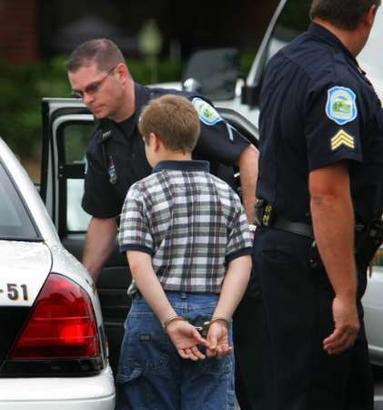This makes me ill.
I’d be tickled to death to have [our students] drug tested!
…singsongs one of the leaders of the Acadia Christian School, up the road from where I live. Which sounds pretty damn giddy — and pretty damn creepy — to my ears. Tickled to death at the prospect of forcibly extracting piss from youngsters. Nice.
I can think of all sorts of reasons why parents and students should oppose drug testing in schools.
• 1. Random drug testing requires children to surrender their bodily fluids on a teacher’s or administrator’s whim.
• 2. It’s a form of coercion that goes well beyond “coercing” them to learn multiplication tables and state capitals.
• 3. It teaches them to be meek and docile, and to go along with any Fourth Amendment violations that authorities care to inflict on them. Sorry, I’m teaching my children the opposite.
• 4. It’s an invasion of privacy.
• 5. It isn’t effective in combating drug use; study after study shows that schools with drug tests have about the same level of drug use as schools without.
• 6. It pushes kids who already use drugs to try newer ones that are even less safe and aren’t screened for, in an effort to circumvent the tests.
• 7. It will saddle (some) kids with a criminal record that may be hard or impossible to expunge.
• 8. I want my school to teach my kids a proper curriculum. I’ll do the parenting, thank you.
• 9. In order for kids to learn well, I want them to be able to trust their teachers. I don’t want them to see teachers as narcs, and I don’t want schoolmates to contribute to a climate of suspicion by being expected to rat each other out. What kind of learning environment is that?
• 10. Slippery slope #1: Caffeine, alcohol, and cigarettes are also drugs. Shall we test for those? Shall we suspend or expel students with traces of nicotine or alcohol in their blood? That’s what zero-tolerance policies are all about, right?
• 11. Slippery slope #2: If it’s all about keeping children safe, shouldn’t we start random family testing too, to combat pernicious influences on kids’ psyches from older siblings and parents? If not, why not?
• 12. Drug-testing students who want to participate in extracurricular programs deters students who, as is common, are only admitted after passing the test. That means they can’t join precisely those activities that — thanks to a structured environment of accomplishment — offer a great opportunity to help students get or stay out of trouble with drugs.
• 13. Drug tests cost money to administer and enforce, and require lots of man hours (excess administrative tasks) to boot. As a parent, I’m not paying for this nonsense.
• 14. Random drug testing perpetuates the War on Drugs that we’ve been fighting and losing for a century already, at tremendous cost to our pocketbooks and to American families everywhere.
• 15. The definition of insanity is doing the same thing over and over, expecting different results.
Me, I’ll be “tickled to death” when more parents stop mindlessly giving their blessing to such disturbing violations of liberty.

You forgot the Bayseian argument that when you use a test with an error rate (and they all have them) on a large population of non-drug using students, you are going to get more false positives than true positives.
http://en.wikipedia.org/wiki/Bayes%27_theorem#Drug_testing
That’s one of the strongest anti-drug-test arguments yet. I vaguely knew of the effect but didn’t know what it was called or how it worked. Thanks Leap.
Same argument can be made for dog sniffs. There are a couple of papers out there breaking it down, but I like this one the best.
Partly because it says “A well-trained, well-handled detection dog can do remarkable things. We know it because of science.” which is just a good argument.
But then this is for making sad “With a pretty good dog, but a largely innocent population, a dog alert will signal drugs only about 16 percent of the time.”
http://law.bepress.com/cgi/viewcontent.cgi?article=5818&context=expresso&sei-redir=1&referer=http%3A%2F%2Fscholar.google.com%2Fscholar%3Fq%3Dbayes%2Banalysis%2Bdrug%2Bdogs%26hl%3Den%26as_sdt%3D0%26as_vis%3D1%26oi%3Dscholart%26sa%3DX%26ei%3DUoAdUbuXC-S62gWs34C4Bw%26ved%3D0CDEQgQMwAA#search=%22bayes%20analysis%20drug%20dogs%22
I’m sorry, I know I am very late on this post, and probably shouldn’t bring it up… However, as a blog that, as far as I can tell, prides itself on proof and knowledge, the definition of insanity isn’t doing something over and over and expecting different results. That’s either gullibility or stupidity. The definition of insanity is as follows;
in·san·i·ty
/inˈsanitē/
Noun
1.The state of being seriously mentally ill; madness.
2.Extreme foolishness or irrationality.
Just wanted to clear that up. Again, I apologize for being so late with this fact, but I just found your blogs (old and new) and thought that should be straitened out.
Literal much?
It’s a famous Albert Einstein quote. http://www.brainyquote.com/quotes/quotes/a/alberteins133991.html
Another reason is that most of the drugs we are so scared about are far less harmful or addictive than alcohol, caffeine, or tobacco. Heroin overdoses are deadly, e.g., only because (1) the antidote has been banned by the government, and (2) prohibition has made it impossible to get known doses. So, why torment people — least of all STUDENTS — with this capricious, vicious, practice?